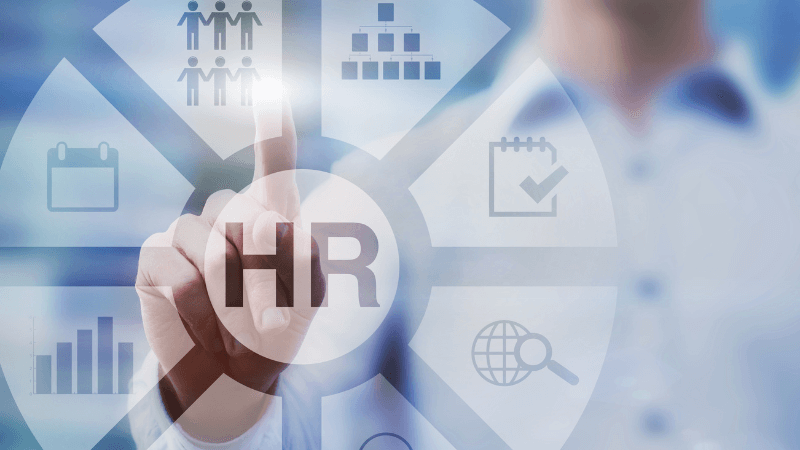Industry TrendsTalent Acquisition & Hiring
How AI is changing the game for HR leaders
August 1, 2023
As businesses become increasingly reliant on technology, the role of Human Resource (HR) leaders has shifted to include leveraging artificial intelligence (AI) to drive greater efficiency and improved employee experiences. We are already seeing a rise in companies investing in HR technology. Fortune Business Insights suggests that the global HR technology market is projected to grow from $24.04 billion in 2021 to $35.68 billion in 2028, with the primary focus of those investments being in AI.
AI can help automate mundane tasks, provide personalized onboarding experiences, and unlock data-driven insights to create smarter engagement strategies. A successful organization is only as good as its people, and HR leaders who incorporate AI into their tech stack are able to focus on building more human connections with their employees.
In this article, we explore how AI is revolutionizing HR operations and its implications for HR practitioners, looking at how they can leverage the power of AI to create more efficient operations and better employee experience at scale.
How HR Teams are embracing AI
In today’s fast-paced and ever-evolving world, HR teams are increasingly looking to artificial intelligence (AI) as a means of transforming their operations. By integrating AI into various processes such as onboarding, background checks, and payroll administration, HR teams can reduce the burden on human resources and optimize efficiency for more meaningful tasks. This can lead to improved employee experiences, reduced workloads for HR practitioners, cost reductions for businesses, and more time spent building relationships with employees.
One of the primary ways HR teams are using AI is in automating time-consuming tasks such as recruitment and onboarding processes. By using AI to identify suitable candidates or streamline onboarding, HR teams can save time and resources that would otherwise have been spent on manual labor. This means they can focus more attention on higher value activities such as developing meaningful engagement strategies, training teams, or conducting performance reviews.
AI also has the potential to help HR teams better understand their employees’ sentiments by leveraging natural language processing (NLP) technology. NLP allows computers to interpret human language to gain insight into how employees and customers feel about certain topics or products. This technology tackles the painstaking task of filtering through hundreds, sometimes thousands, of open-text comments from suggestion boxes, employee engagement surveys, and social media to identify trending topics.
The potential of AI tools to transform HR operations shouldn’t be underestimated; while much of the work done by these technologies is still nascent, improvements are being made every day as new algorithms are developed and tested out in real world scenarios. For example, chatbots powered by natural language processing technology can be used to automate answering frequently asked questions from employees about policies or procedures.
Predictive analytics powered by AI support companies with forecasting future trends in the labor market. By examining employee retention rates over time or evaluating data from other career sites like LinkedIn, organizations can gain valuable insights about what type of candidates are likely to succeed within their company as well as the competition for certain jobs in a given area. All this information helps HR departments make informed decisions regarding recruiting new talent or revising existing job descriptions accordingly.
HR practitioners must understand how best to use AI tools if they want them to be effective in driving organizational transformation; this includes recognizing its strengths and limitations so that it is used judiciously rather than blindly adopted without consideration of its capabilities or impact on people’s lives. AI is enabling unprecedented levels of efficiency and efficacy in HR operations, allowing teams to stay agile while simultaneously understanding their workforce’s needs and behaviors so they remain competitive in today’s ever-evolving business environment. Let’s take a closer look at how AI is revolutionizing HR operations:
- Talent Management: By analyzing data from a range of sources such as job postings, job applications, internal promotions or transfers, employee performance reviews, or exit interviews organizations can use AI to gain insights into current labor trends in the market to make smarter recruiting decisions.
- Automation: Automate time-consuming administrative tasks such as filling out paperwork or managing standardized forms. AI can tackle payroll workflows, assist employees in managing their benefits with self-service tools, or identify areas of improvement based on employee performance and recommend upskilling opportunities.
- Natural Language Processing (NLP): With NLP algorithms tracking how employees interact with customers or colleagues across different channels — email threads, chat conversations, etc. – organizations can gain deeper understanding into what employees really think about their job satisfaction levels or engagement levels at work.
- Onboarding: AI tools are also helping reduce onboarding times drastically by automating many of the activities associated with welcoming new hires into an organization — setting up accounts and profiles on various platforms; sending out welcome kits; providing information about benefits and perks etc – all without having a person carry out these tasks manually.
Overall, it is clear that AI is revolutionizing HR operations and ultimately helping organizations create more efficient and effective operations overall.
Will AI take the “human” out of “Human Resources”?
As AI technology continues to advance, HR leaders are beginning to realize its potential for their operations. While AI can automate tasks and provide quick answers to employee queries, it’s also being used for more complex processes such as recruitment, onboarding, and employee sentiment analysis.
With this increased use of AI in HR operations, there comes a need to consider the ethical implications as well. Using AI in HR raises questions about whether it can truly understand human interactions and emotions—something that is crucial for effective Human Resources management. From an organizational point of view, AI has the potential to streamline processes and reduce costs while still providing personalized services. However, its implementation could fundamentally change the role of HR professionals by taking away some of the traditionally human-led processes they oversee. For example, if automated recruitment algorithms are used to source prime candidates, HR leaders are afforded more time to conduct quality interviews. Similarly, automated tools for measuring employee sentiment might replace traditional assessments done by an HR team or external consultants.
Despite these changes to existing roles due to advancements in Artificial Intelligence (AI) technology, there is still a need for human expertise regarding making strategic decisions. We still need HR leaders to define the best hiring practices for their organization or understand nuanced issues and determine the right solutions related to employee engagement or morale. As such, even though certain aspects of their roles may change due to increased use of artificial intelligence, HR teams will remain essential components in any organization looking forward to a future powered by technology.
As HR practitioners explore these opportunities, it is essential to remain mindful of how best to use these new technologies — striking a balance between automation and human oversight, using them ethically, and having a “people-first mindset” underpinning all initiatives. The key here is to understand that introducing AI into your organization’s tech stack is not intended to replace any role or function, rather, it is intended to enhance the capabilities of your existing team by streamlining time-consuming processes so they can focus more on delivering a world-class employee experience. Only then can organizations benefit from the advantages of AI while still ensuring they are staying true to the “human” side of Human Resources.
Exploring how AI can enhance employee experience
As HR leaders look to the future, they are increasingly turning to AI-driven technologies to help them understand and enhance employee experience. AI is helping HR teams create more effective strategies that promote better outcomes for their organizations by automating processes, collecting employee feedback data, improving segmentation, and providing better service quality. Leveraging insights from AI-based solutions enable HR teams to identify potential areas of improvement, better understand how different teams respond to organizational changes, and gain a deeper understanding of employee sentiment and engagement.
With AI, HR teams can provide tailored recommendations for employees based on their skill sets and preferences. For example, an AI-based system can recommend specific courses or certifications that would better equip an employee with the tools necessary for success in their role.
AI is also helping HR teams understand employee sentiments and engagement levels by analyzing employee feedback or social media posts about the company. By understanding how employees feel about certain initiatives or policies in near real-time, companies can make smarter decisions about their strategies. Additionally, AI tools can be used to measure job satisfaction levels among different departments or job roles, ensuring that all members of staff feel valued and supported.
By utilizing the power of AI-driven technologies, HR leaders have the opportunity to revolutionize their operations while still providing personalized services designed specifically around meeting the needs of each individual employee. With this technology at its disposal, no organization should miss out on unlocking its full potential through improved efficiency and greater insight into its most valuable asset — its people.
Tune into your frontline with WorkStep
With the frontline employee engagement platform that delivers the real-time insights you need to take action, retain your workforce, and drive your business forward.
Tom Goyette, Product Marketing Manager | tom.goyette@workstep.com
Tom Goyette is a Product Marketing Manager at WorkStep. With experience in start-up and enterprise level SaaS and eCommerce organizations, Tom excels at managing and creating content, marketing, and analytics. Tom believes people are at the center of every great organization and is eager to share stories that highlights the value of the employee voice.



